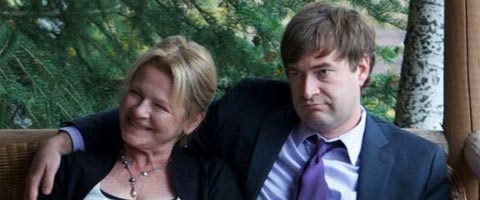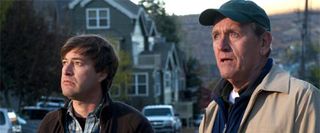Darling Companion's Mark Duplass Talks Being A Workaholic

Mark Duplass is one of the most prolific people in Hollywood. In addition to writing, directing and producing his own films with his brother, he is the lead actor on the hit FX television series The League, regularly takes roles in films, and produces movies by independent filmmakers. Considering most people in the industry buckle under the pressure of half as many duties, how does the multi-hyphenate keep it together? According to Duplass, a big part of it has to do with the fact that he's a workaholic.
Prior to the release of Darling Companion I was given the opportunity to sit down with Mark Duplass to discuss not only his career juggling act, but how he came to be part of Lawrence Kasdan’s stellar cast, the way that writing affects his acting, and doing a bit more writing for studios. Check it out!
How did you first become involved with the project?
Lawrence Kasdan called up my agent and asked about me – I know his son Jake a little bit, and he had seen my movie, The Puffy Chair, and kind of related, I work with my wife, he works with his wife, and this was his first independent film. He’s never told this to me, but I suspected that part of it was me as an actor, but part of it was also about someone who’s made cheap movies before, having them on set. So he called me and we talked about what it means to be a man for about an hour, different versions of manhood in 2012. It was really cool and then he said, “I want you to do it.” And I was like, “Far be it from me to turn down a movie directed and written by Lawrence Kasdan” starring this cast. I was pretty thrilled.
Did you ever feel like a consultant?
No, I didn’t, honestly. There were two or three moments, honestly, where we shooting a car scene and I was watching the overly complex rigs go on and the late was fading, and I just said, “Hey guys, I do know a way to shoot this…” I thought I could be helpful. But mostly it was me having a great time being with some of my heroes, getting to know them and hearing great stories. Also, I learned a lot about screenwriting and the process of the classic Hollywood screenwriter that Lawrence Kasdan is, and I’m different from that. But it was cool, man. It was really educational in a lot of ways.
Is it stuff that you can see applying to your own work?
CINEMABLEND NEWSLETTER
Your Daily Blend of Entertainment News
To a certain degree. Larry knows what he wants and he goes in and gets it. As a filmmaker, I go in and find what I want. So it’s two very different processes, I guess. But his ruthless efficiency with dialogue haunts me [laughs]. “I know he can do this more quickly and succinctly than I’m doing it, how can I figure that out?”
Do you have to kind of watch yourself on set in that case, just to make sure you’re not stepping on anybody’s toes?
I certainly try to be mindful, but the good news is that Larry and Meg are two of the nicest people on the planet, so there was really nothing to be careful about and he’s a great leader of ship. He knows what he wants, so it’s not like there were a lot of opportunities for me to overstep even if I wanted to.

I have to imagine that being a writer/director has some influence over you as an actor in terms of the way that you approach character. Would you say that’s true?
It does. It 100% does and it can mean a bunch of things. It can mean, “I’m so sick of doing dramatic comedies,” because I direct them and write them, that I want to do something completely fucking different, like The League. Or it can mean…I really like working with first time directors a lot. There’s a movie called Safety Not Guaranteed that I did and he was a first time director and it was great because he’s a phenomenal writer and I got to be somewhat helpful at times with that movie. And when I work with my friend Lynn Shelton on our movies together, I guess we have a co-collaboration that goes on. So I am sometimes applying some of the writing directing skills, but sometimes I’m just an actor and it was more that case on Darling Companion.
It kind of brings me to a larger point, which is that you always hear about actors who star on television shows kind of struggling with their schedules and figuring out what movies to do. You not only star on a TV and act in many movies, but there are also the films you do with your brother. How do you keep all that scheduling in your head?
Well, The League only shoots three months out of the year – thirteen episodes, we shoot really quickly. And so that’s really good and that’s part of why I’m on the show. I could never be on a show like The Office or Parks and Rec, as much as I love them, their schedules would kill everything else I want to do. And I work with a partner, I work with my brother, so we’re efficient. And I’m just a workaholic. I love working, I love working fast. When I hear you say that, I’m objectively saying, “You’re right, I put out a lot of stuff in the course of an average year,” but it doesn’t feel to me like I’m a maniac. I sleep eight hours a night, I play with my kid, I have a normal life. I just think that when it’s nine to five I never stop.
But do you ever feel any kind of timing pressure
Yes. I’ve had to turn down things that I really want to do because I’m directing a movie or I’m on The League or whatever. And whatever, high class problems, but I have felt that a little bit. I know some people who are just actors and their schedules are open for the year and I get jealous sometimes. Like, “Oh fuck, you can take whatever you want!” The balance that I get lifestyle-wise out of doing all this stuff is healthy for me. So I guess it’s a worthy price to pay.
Does that work for writing as well? What is your writing process with your brother?
We work very quickly and we try to structure our movies out together and then I bang away at those drafts very quickly. And we’re starting, in the last couple years, to do more writing work, traditional writing work inside the system as well. And we really enjoy that.
Like what kind of stuff?
Just either rewrite work for scripts going into production or adapting novels for people, or stuff like that. And so I guess it’s just a process of knowing what I’m good at so that I don’t end up on a project that’s going to take me three years to figure out how to do it. I’m usually jumping into something where I know I’m the right person for this job and I can do it in two months so I’ll take this one.
I know you and your brother have The Do-Deca-Pentathlon coming out later this year, but do you know what your next project is going to be?
You know, we’ve made five movies in the last six years, so we’re going to do a lot of writing work this year, writing things on spec and writing things for studios, and Jay just had a baby and I’m having one in a couple weeks.
Congratulations!
So we’re going to do some family time and then The League starts up pretty quickly for us. So I think we’re gonna…we had a drawer full of scripts that allowed us to make those movies in six years, and that drawer is kind of empty now, so I think we need to restock it.

Eric Eisenberg is the Assistant Managing Editor at CinemaBlend. After graduating Boston University and earning a bachelor’s degree in journalism, he took a part-time job as a staff writer for CinemaBlend, and after six months was offered the opportunity to move to Los Angeles and take on a newly created West Coast Editor position. Over a decade later, he's continuing to advance his interests and expertise. In addition to conducting filmmaker interviews and contributing to the news and feature content of the site, Eric also oversees the Movie Reviews section, writes the the weekend box office report (published Sundays), and is the site's resident Stephen King expert. He has two King-related columns.
Most Popular







